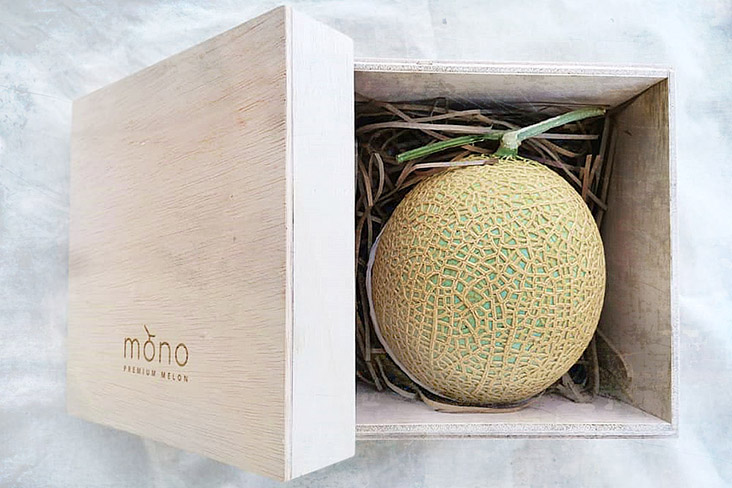PUTRAJAYA, March 30 — Browsing the aisles of a Tokyo depachika (basement food halls inside Japanese department stores) can be an eye-opening experience. The beautifully crafted and delicate desserts and pastries, the aroma of meats and mochi being grilled before your eyes, the 15,000 yen (RM570) melons...
Wait, what?
Premium fruit is an industry unto itself in Japan, where gift giving has long been a tradition marked with deep meaning and deeper pockets. A 15,000 yen muskmelon might just be a starting point; in 2019, a pair of Yubari King melons from Sapporo was auctioned for a breathtaking 5 million yen (over RM190,000)!
But what has this got to do with farmers in Putrajaya?
Enter Mono Premium Melon, a wholly Malaysian owned endeavour focused on locally farmed muskmelons. The fruits are grown from the seeds of Arus muskmelons — considered the most expensive melons in the world — that are sourced from Japan.
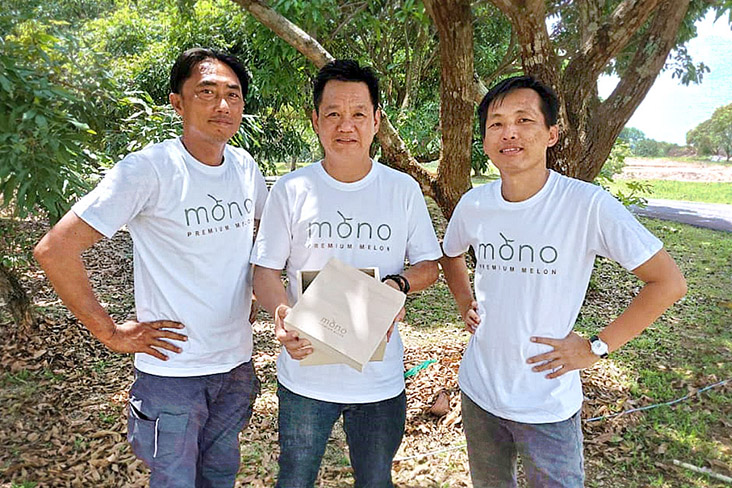
Mono’s co-founders are a team with substantial background in agriculture: hydroponics and fertiliser expert Seh Cheng Siang, 40, is joined by Mohd Sofian bin Ali, 47 (agriculture engineering), Yeo Chen Swee, 51 (agrochemical and pest & disease management), and Michael Lo, 42 (sales and marketing).
Seh says, “We decided to start up our first melon farm in Putrajaya. It houses close to 10,000 melons. We would like to showcase that many Malaysian growers can produce equivalent if not better-quality fruits compared to imported fruits.”
One of the challenges in farming muskmelons in Malaysia as compared to other countries, according to Seh, is in the selection of melon varieties that will suit our hot and humid weather.
He explains, “We have tested more than 100 varieties of melons. A few types have been selected based on their suitability to grow in tropical weather, resistance to disease, eating quality and shelf life.”
Other considerations include technical know-how and growing techniques; precise water and nutrient management; as well as the perennial issue of manpower.
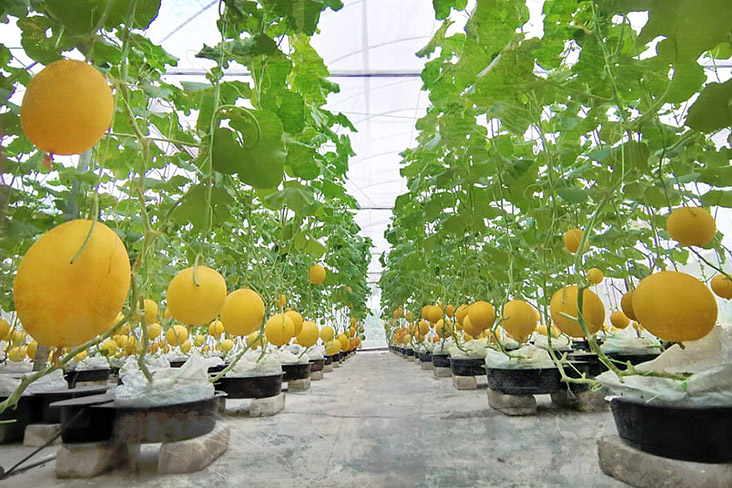
Seh says, “There’s a shortage of workers; anyhow we still decided to only use local workers. We are committed to hire only Malaysian farmers who share the same belief in farming. This is our responsibility to provide more working opportunities to local growers.”
This means there is room for both experienced veterans such as Abang Hassan, 41, who has been farming since 2004, as well as eager newbies such as 19-year-old Jijoy, whose youth belies his ambition.
Of course, obstacles can be opportunities, if viewed in the right spirit. Seh observes, “Unlike temperate countries with only two to three cycles of melon growing seasons a year, with 365 days of summer-like weather in Malaysia, we can grow up to five seasons of melons in a year!”
This confidence in our region’s climate seems well placed: muskmelon farming from seeds imported from Japan is already ongoing in Brunei, with exports targeting growing markets such as China. So who is Mono’s target audience?
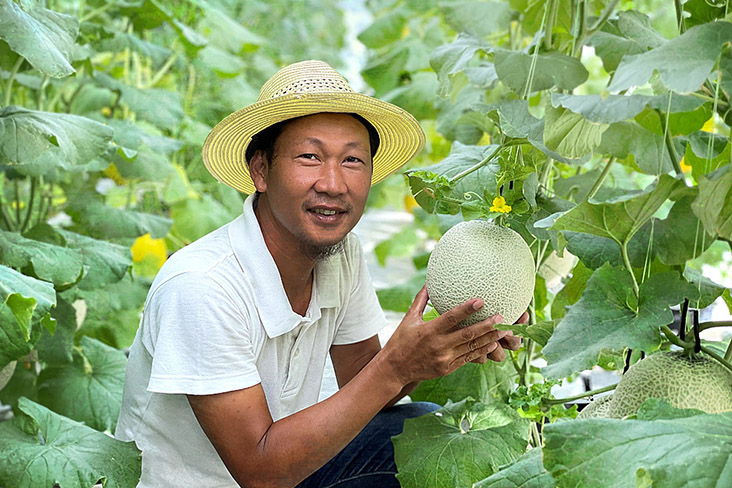
Seh says, “It’s Malaysian-grown for Malaysians. We believe there is a huge vacuum for premium locally grown fruits, so we would like to focus on the Malaysian market. We are also looking at neighbouring countries such as Singapore; we are currently discussing with a few counterparts there on exporting our premium melons.”
Exactly how premium are these melons? Well, for one, the farmers will only keep one fruit per plant to concentrate the nutrients absorbed.
Seh says, “We have a limited quantity of 200 premium Japanese melons grown with full care. ‘We dare to reject’ which means we only select the most well grown melons and reject the balance.”
These are grown in “a fully environmental control greenhouse” where they are watered and fed by a plant-driven hydroponics system called Autopot. Seh says, “It helps regulate the watering and feeding based on plants’ requirement; not water and fertiliser run-off and wastage.”
The nutrients are precisely controlled by an IoT controller — which also manages other parameters such as pH, humidity, water and air temperature — thus ensuring the aforementioned “one fruit per plant” gets all the good stuff.
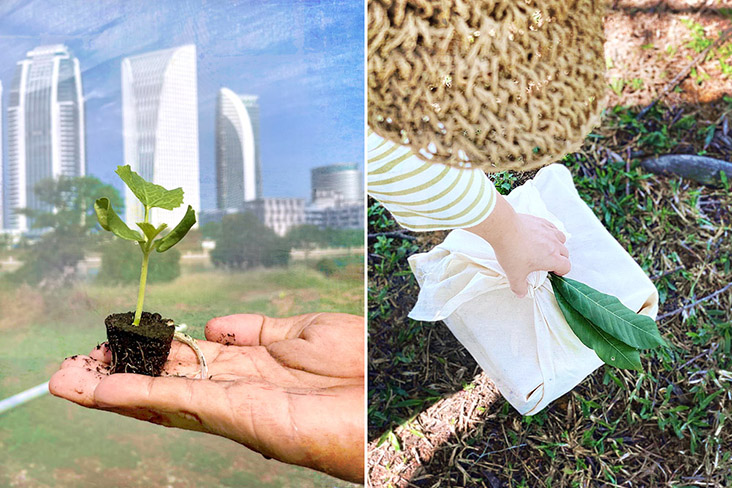
Seh adds, “We take care of our fruits’ ‘welfare’; each of them listens to well composed music to stimulate their growth. Each fruit is polished and massaged with a specific 3M Nexcare facial cleansing cloth.”
If these last couple of statements sound outrageous, readers might be reassured to know this is considered standard operating procedure at similar farms in Japan. These practices are believed to affect the final quality of the fruit.
This massage technique is called tama-fuki or “ball wiping” and is used in the premium melon farming category to purportedly stimulate and enhance the melon’s level of sweetness.
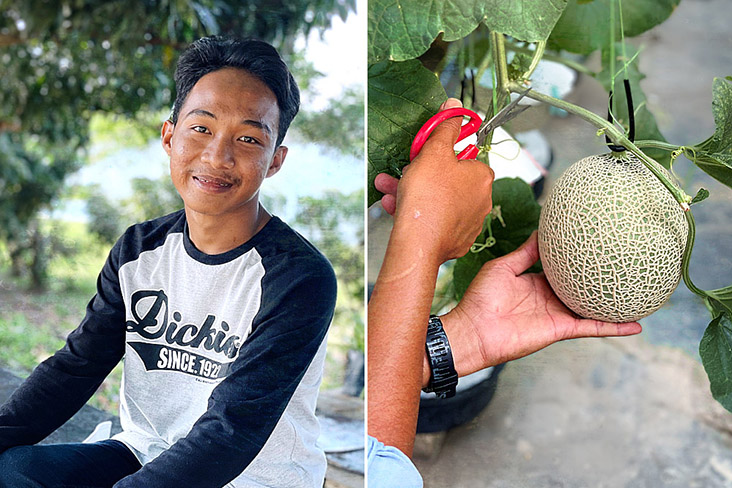
Of course, Japanese farmers also massage Kobe cattle with rice wine and play classical music for their listening pleasure, so take that how you will. (I’m certainly amused by the fact melons and cattle are being pampered far more than I am.)
Pre-sales of these fruits will be through the Mono Facebook page. In launching the first batch of 200 melons, Seh says, “Each melon is allocated to an individual buyer, so the buyers will have the opportunity to witness the growing of their melons and harvest the melons themselves during the farm tour.”
Every melon will be packed in a local handcrafted wooden gift box. The buyers can then perform the final wrapping with Furoshiki wrap. The tentative harvesting date for the first batch is the middle of April.
Once the first harvest is over, the company plans to increase the number of melon varieties they farm in the near future. Seh shares, “We will exclusively import another two types of premium melon seeds directly from Japan. Currently we are in the final stage of R&D. We believe Malaysians will soon be able to taste it.”
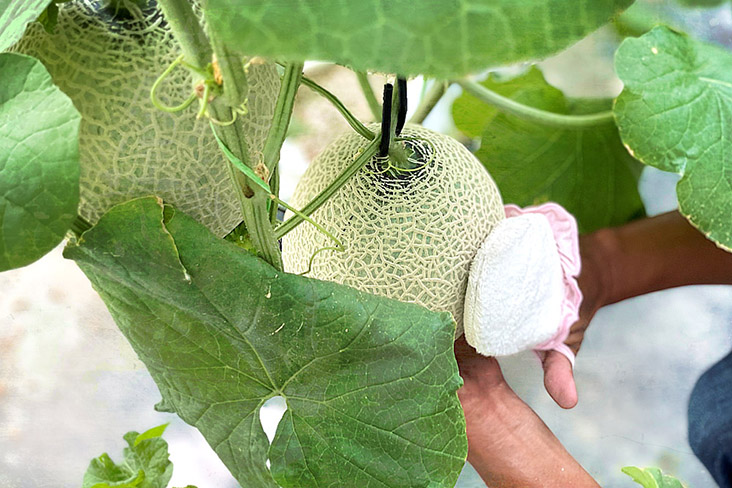
Clearly the value chain from grower to end-user is getting shorter and closer. Seh says, “Covid-19 is a challenge but the expanding use of social media, online selling and quick delivery has helped the local grown fruit industry. Now many growers can sell direct to end-users without going through selling channels such as wholesalers and retailers.”
Despite the premium positioning, it won’t be entirely about bringing in fruit from distant lands to be grown on home soil. Malaysia is a haven for tropical fruits and even less obvious candidates such as figs have been farmed. Picking strawberries in Cameron Highlands is practically a tradition these days.
It’s all part of their master plan. Seh says, “We are also engaging other local growers that share the same belief as us to produce premium local-grown fruits. So the Mono brand will soon expanding to other types of local fruits or fruit products.”
In doing so, Mono is not only extending their reach beyond a single premium melon — which, being so specific in its charms, might have a limited market — but also to other fruits that can be positioned appropriately as a higher value offering.
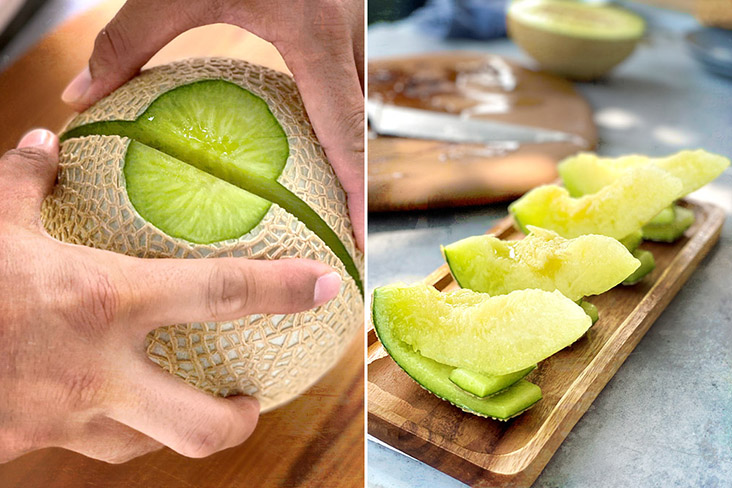
And with that, a new lifeline for farmers, both veterans and new ones who are joining the industry. In these uncertain times, doing things differently might prove to be not only profitable but a salve to others seeking a chance to prosper too.
For pricing and to learn more about Mono Premium Melon, visit:
















